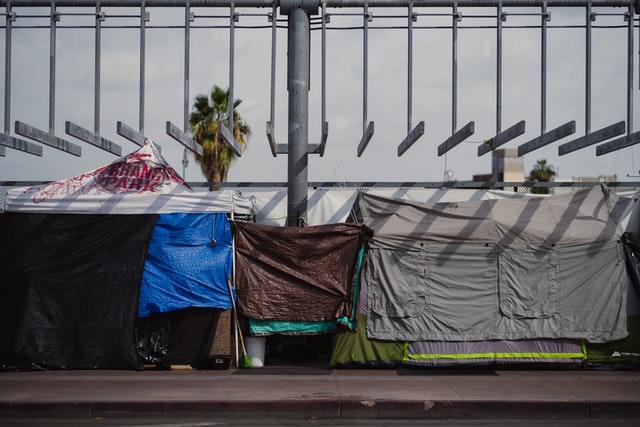
The number of people visibly living in encampments has increased throughout the COVID-19 pandemic. This has led to cities — including Toronto, Victoria and Vancouver — to work with encampment residents to move them into shelters, hotel spaces and more rarely, stable housing.
When those offers are declined, the next step can be the removal of residents’ belongings, and sometimes — such as recent events in Toronto and Halifax — violent evictions by police.
As researchers who work to improve the health and well-being of people who experience of homelessness, we are deeply concerned about the long-term consequences of this approach. Not only is it morally questionable to punish the most vulnerable, it isn’t an effective strategy for addressing homelessness. Criminalizing poverty doesn’t work.
Encampment life is difficult
The first step in addressing this problem is understanding the answer to this basic question: Why are some people in encampments insisting on staying where they are?
Encampment life is difficult. Year-round exposure to the elements and lack of running water or sanitation can make daily survival an enormous challenge. Yet, some do not feel safe in the shelter spaces they are being offered.
In Toronto, the number of violent incidents in shelters has more than doubled from 120 incidents in 2016 to 368 in January 2021. And in April 2021, there were COVID-19 outbreaks across 20 shelters.
Although the city of Toronto reports that 1,670 people have been referred to inside spaces since April 2020, only nine per cent of those people have been moved into stable housing. The rest are still in shelters or hotel rooms. With little hope of moving into stable housing, people may be skeptical of leaving encampments only to get stuck in the shelter system.
Other encampment residents may feel that their mental health and well-being depends on the support systems they’ve established in their encampments. Being homeless comes with powerful stigma and social exclusion — but an encampment can be a place to belong.
Destroying trust
Encampments are not long-term options. People cannot live in public parks indefinitely, and no one is arguing for that as a solution. However, forcibly displacing people from encampments destroys trust with service providers and actually makes it harder to convince people to move into shelters or hotel spaces.
For Indigenous people living in encampments, forced evictions can be linked to intergenerational memories and trauma of residential schools, the ‘60s Scoop and other colonial practices. Exacerbating trauma and breaching trust can push people further away from the very services we are trying to connect them to — including housing programs, mental health support and COVID-19 vaccination efforts.
The end-goal is stable housing. Encampments are a result of a national housing and affordability crisis. As we push for a real solution — an increase in housing supply and related supports — the encampment evictions must stop. We need to make encampments unnecessary.
Building trusting relationships
We can make encampments unnecessary with a trauma-informed, person-centred approach that builds trusting relationships between service providers and clients. Not all individuals have the same needs, and we need to offer people a range of options: hotel spaces, rent supplements, case managers, peer support workers and other social and health supports.
When offering people spaces, we must recognize that people are part of existing communities and these connections are vital to their well-being. Allowing people to move in groups to the same locations can help people combat social isolation, stay housed and support their mental health.
Some incredible work has already been done. In September of last year, the federal government announced a goal to end chronic homelessness. During the pandemic, federal, provincial and municipal governments mobilized resources, developed solutions and coordinated efforts in unprecedented ways — including in encampments — and bolstered investments in affordable housing development.
Some cities, such as Victoria, have committed to full-scale transformation of the homeless-serving system, rooted in a right to housing and human-rights approach.
Our hope is that the unprecedented efforts from governments and community groups are just the beginning of a more humane, consistent and evidence-based approach to addressing chronic homelessness in Canada. There is momentum now, and with it the newly elected federal government has an opportunity and responsibility to move people off the streets and into safe, permanent homes.
- Jesse Jenkinson Postdoctoral Fellow, MAP Centre for Urban Health Solutions, Li Ka Shing Knowledge Institute, St. Michael’s Hospital, University of Toronto
- Stephen Hwang Professor, Department of Medicine, University of Toronto
Disclosure statement
Jesse Jenkinson receives funding from Canadian Institutes of Health Research.
Stephen Hwang receives research funding from Canadian Institutes of Health Research and St. Michael’s Hospital Foundation. Stephen is also the director of MAP Centre for Urban Health Solutions, Unity Health Toronto, and a physician at St. Michael’s Hospital.
This post was originally published at The Conversation.





